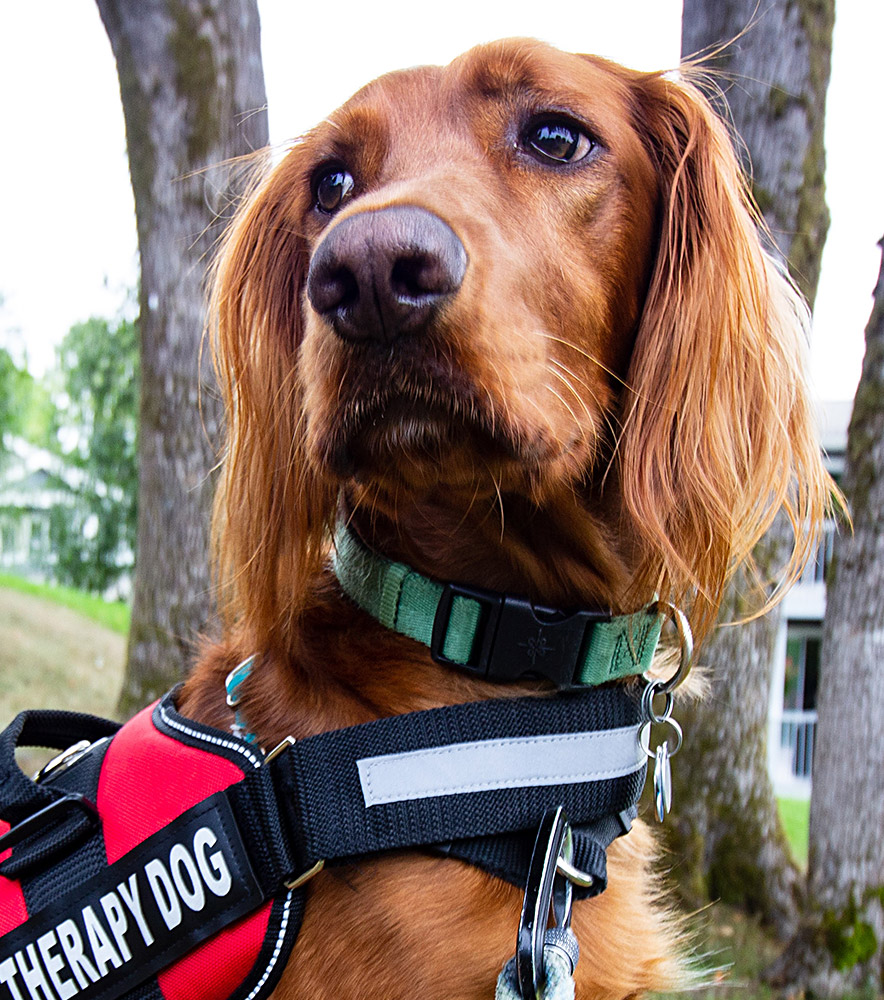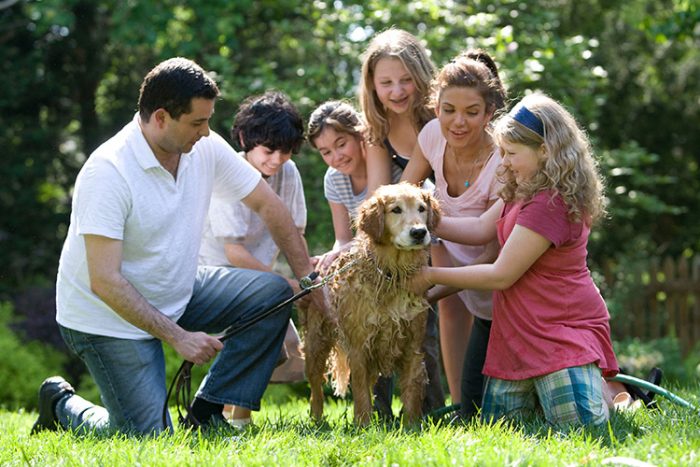Home Page › Blog › How Can My Dog Become a Therapy Dog?
How Can My Dog Become a Therapy Dog?

Is the following true for your dog? Around people and other dogs, your dog is amiable and well-behaved. Your dog adores hugs and likes to cuddle for long periods. When surrounded by new people, your dog remains calm. Your dog gives you feelings of warmth and contentment that you’d like to share with others. If you’ve answered “Yes!” to these questions, your dog might make an excellent therapy dog.

What is a Therapy Dog?
According to the American Kennel Club (AKC), a therapy dog visits facilities or settings which care for people with emotional, mental, or physical concerns. For example, many nursing homes have visits from therapy dogs to help provide affection and engage their residents. Hospitals may allow scheduled therapy dog visits to boost the patient’s spirits. Therapy dogs can also help first responders overcome stressful situations or lift emotions during a time of crisis. In short, therapy dogs provide comfort to people who need it the most.
Therapy dogs are not service dogs or emotional support animals (ESA). Service dogs have public access privileges under the Americans with Disabilities Act (ADA) and other federal laws. These dogs receive months of specialized training to performs necessary tasks to assist their disabled handler. Emotional support animals, which require an ESA letter, are also covered under specific federal laws but don’t need training. ESAs simply comfort their handlers with their presence.

How a Therapy Dog Works
You’ve probably noticed how your dog can make you feel loved, less stressed, and much more relaxed. Therapy dogs do the same thing, but for others. By interacting with other people, therapy dogs are scientifically proven to do the following for humans:
- Reduce physical pain
- Release “feel good” hormones like oxytocin, endorphins, and phenylethylamine
- Lower stress hormones like cortisol
- Reduce feelings of anxiety, aggression, and fear
- Trained to interact with a variety of people
- Usually have stable temperaments and have a friendly, easy-going personality
- Help provide psychological or physiological therapy to individuals other than their handler
Can’t All Dogs be Therapy Dogs?
As cute as all dogs are, being a therapy dogs takes a special kind of dog. Because therapy dogs visit different healthcare facilities and may need to interact with numerous strangers, a therapy dog must be safe at all times. A therapy dog should have the following traits:
- Naturally friendly and affectionate with everyone
- Enjoys meeting new people
- Comfortable in new environments
- Relaxed and doesn’t get startled easily
- Likes physical affection
- Able to sit and be petted for long periods
- Enjoys and is safe with children
- Healthy, well-groomed, and has regular check-ups and vaccinations
A dog who is calm and sweet in the family home, but is wary in new environments, may not be an ideal candidate to become a therapy dog.

Therapy Dog Training and Certification
Although a therapy dog doesn’t need the extensive training that a service dog does, they require some instruction level. You can choose to train your dog or outsource the training to a formal organization. The American Kennel Club’s Canine Good Citizen test is an excellent guideline for training. A therapy dog must pass necessary real-world scenario behavioral tests to ensure that they will be safe in a new environment.
The facilities a therapy dog visits will usually require certification and health-check to visit. The American Kennel Club recommends the few recognized therapy dog organizations on their website to certify with. To become certified, an observer or tester in your area will test you and your dog on handling skills, basic social behaviors, and demeanor. They will also observe you and your dog on visits to medical facilities.
Where Can a Certified Therapy Dog Go?
Unlike a service dog or ESA, a certified therapy dog is only allowed in places where they perform their jobs; hospitals, nursing homes, mental health facilities, etc. Therapy dogs don’t have public access and are considered pets when traveling, looking for housing, or entering places of business.
A therapy dog also can’t walk into a hospital or nursing home unannounced. Typically, arrangements with the facility are made beforehand, ensuring that the therapy dog is safe and certified. Furthermore, the facility schedules an allotted time to allow for therapy dog visits. During this time, the handler is present overseeing interactions.
Can Your Dog be a Therapy Dog?
Your dog doesn’t need to be the Albert Einstein of dogs to be a therapy dog. All they need is a great temperament, a friendly attitude, and be safe in new environments. Your dog should be a people-person, healthy, and respond quickly to your commands. If your dog meets the criteria above and can become certified, your dog can indeed take on the noble task of being a therapy dog.
About the Author: The writing team at Service Dog Certifications is made up of folks who really know their stuff when it comes to disability laws and assistance animals. Many of our writers and editors have service dogs themselves and share insights from their own experiences. All of us have a passion for disability rights and animals.
Latest Posts

Ohio Service Dog Requirements
You can bring a service dog almost anywhere where pets aren’t allowed in Ohio as long as you meet all the necessary requirements. The rights of service dog handlers in the Buckeye State are covered under federal and state laws. This guide will walk you through Ohio’s legal requirements for service dogs. Ohio Health Requirements […]

Read More

How to Bring a Service Dog to Disneyland
Trained service dogs are more than welcome to join their handlers at Disneyland. In this guide, we’ll explain Disneyland’s policies and give practical advice for bringing a service dog to Disneyland for the first time. Disneyland’s Service Dog Policies The Magic Kingdom is happy to welcome trained service dogs across most park locations! They kindly […]

Read More

Can Dogs Eat Tomatoes?
Yes! Dogs can safely enjoy tomatoes, but there are a few risks to be aware of so you can feed your dog responsibly. Fully ripe tomatoes (without the stems and leaves) can actually have nutrients that are good for your pup. Tomatoes have chlorogenic acid, an antioxidant that can have anti-inflammatory effects in cells. They’re […]

Read More






